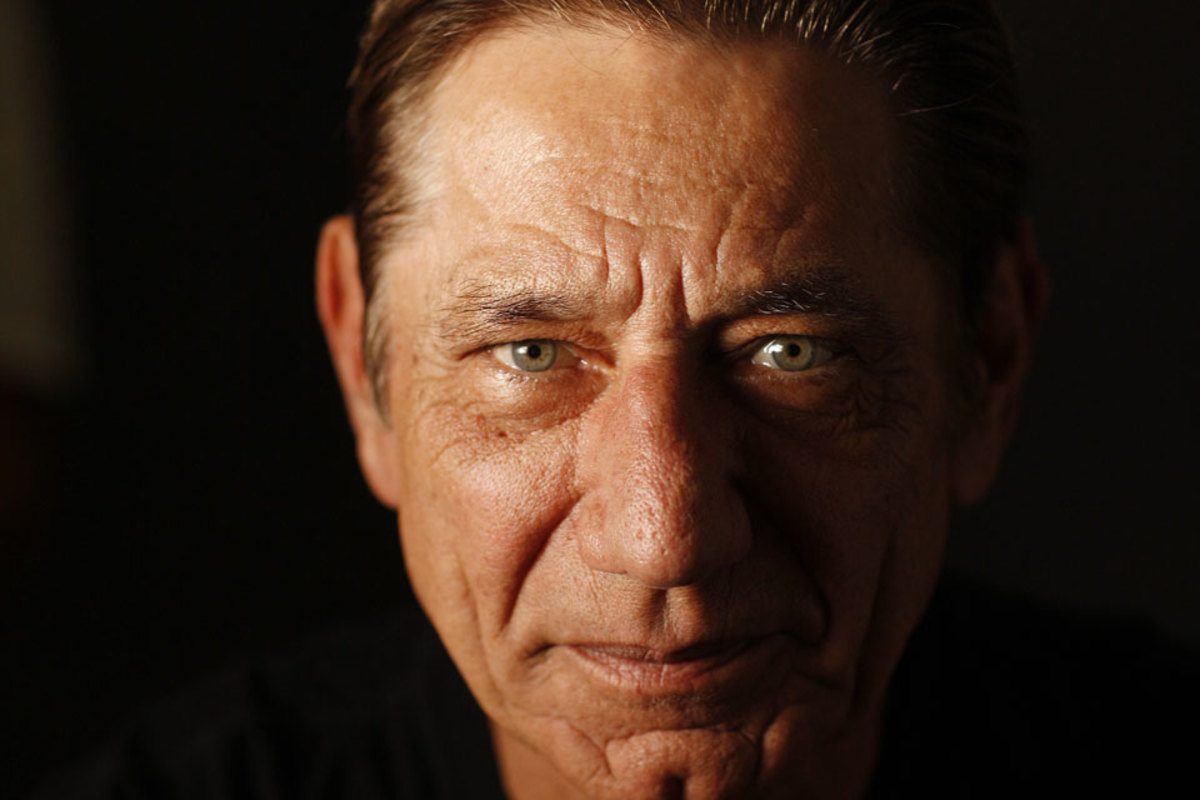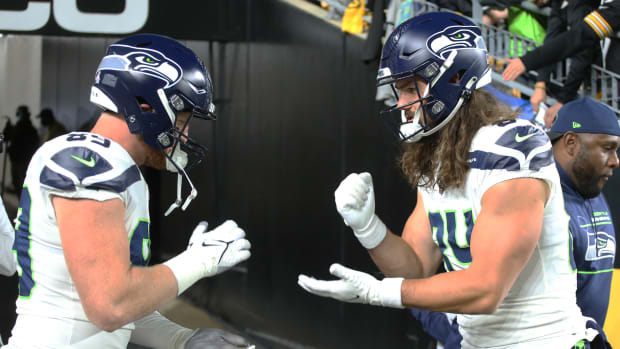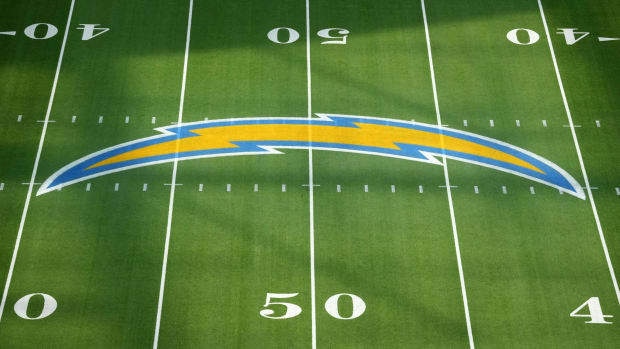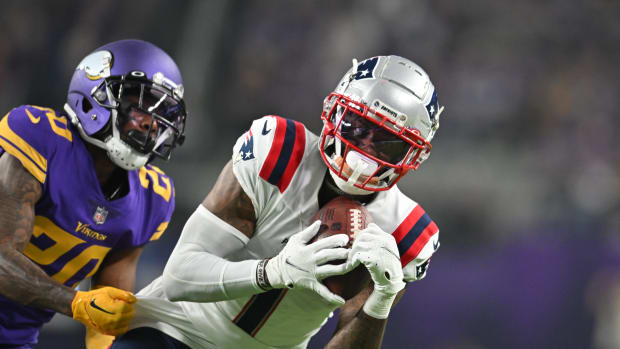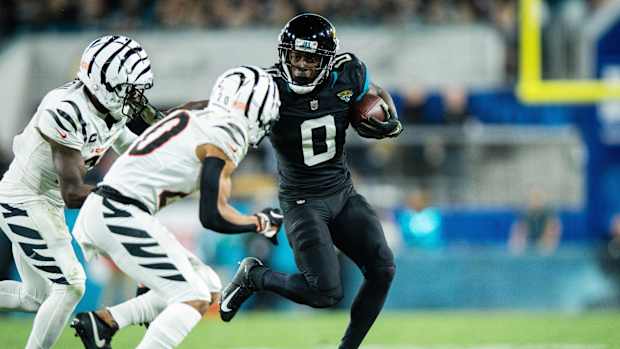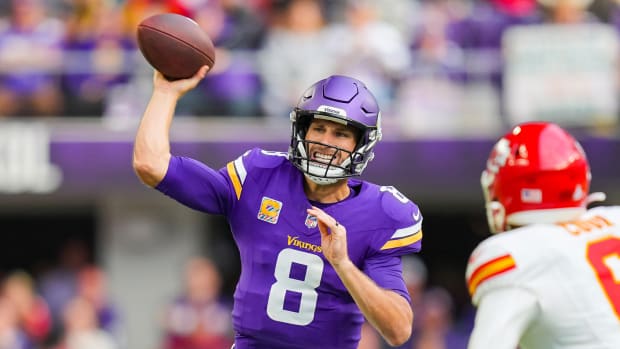Joe Namath: ‘No One Has Ever Played the Game Better Than Tom Brady’
Joe Namath says he’ll call at 9:30 a.m., and at 9:30 a.m. on the dot, a call comes in from his home in South Florida. “That’s part of the old quarterback in me,” Namath says. Conversation is always easy with Broadway Joe, whether it be about his first grandson, Nickoli William, who was born the Wednesday before Super Bowl XLIX; Seattle’s infamous goal-line interception; or Namath’s beloved Jets. Lately, though, he’s paid especial attention to one topic that hangs over all facets of the game of football—head injuries. The Super Bowl III MVP is the namesake of the Joe Namath Neurological Research Center in Jupiter, Fla., and he’s working to raise $10 million for an FDA-approved clinical trial of a treatment program for traumatic brain injury using hyperbaric oxygen. Once a trendsetting young quarterback, Namath, now 71, is still trying to make an impact on the game of football.
VRENTAS: Give us your take on Super Bowl XLIX, through the eyes of the Super Bowl III MVP?
NAMATH: This was the 49th Super Bowl, so I’ve had the honor and pleasure of being to several Super Bowls over the years. This was one of the best games I recall, if not the best. The most exciting, other than playing in one, you see. Well, there have been some other good ones, too. The finish was dramatic. You know, I am a guy that believed Pete [Carroll] made the right call that didn’t work. Earlier in the game, there were situations where [Marshawn] Lynch was stopped for no gain. When you see eight New England Patriots at the line of scrimmage to stop the run, that’s not just eight players up there, that’s eight Patriots that are pretty darn stout, or they wouldn’t be there in that position in the first place. Given the belief that Pete knows, with his coaches, exactly what they want to do in a given situation, what is the best opportunity, I really believe he called the play that they figured would be best with single coverage, and not butting heads, and in that given situation, with the time and the one timeout. It just didn’t work. That young man [Malcolm] Butler made a great play. I don’t believe Russell Wilson saw Butler. Having played the position before, had he seen Butler in that break position, he would have maybe put it on the receiver’s back shoulder. But it was such a flash, you know. From where Butler was, and came from, I really believe Russell didn’t see Butler, and he threw a strike right out there in front of the receiver. If you get real picky, you would have thought that the receiver would have been coming harder inside, a step faster. When I watch his body movement, watch his break inside, I don’t think it was as explosive as it could have been. I give all the credit in the world to Butler for making an absolutely great play and, wow, what a hero, coming from where he came from onto that team. What a finish for the season for him, boy.
The MMQB ICYMI
Seattle’s infamous interception overshadowed a career-defining game by the Tom Brady, who explains from his perspective what went down in the final quarter FULL STORY The official start of the offseason marks the transition from u201cwe timeu201d to u201cme timeu201d for NFL players. Here are 12 offseason predictions about who will get paid, who won’t, and how ongoing controversies will be resolved FULL STORY Cal wideout Chris Harper declared early for the draft and now is a combine snub, precisely the scenario the NFL is trying to avoid. Plus, get to know an ex-Oregon QB not named Marcus Mariota FULL STORY Shaq Thompson, a likely first-round pick, spent the past three seasons proving he’s capable of just about anything on the football field. But the first time he went pro, he proved to be anything but a can’t-miss prospect FULL STORY Our NFL film-study maven Andy Benoit and college football know-it-all Andy Staples will break down the needs of all 32 teams and suggest which prospects would be the best fit. We start in the division that the Lombardi Trophy calls home... FULL STORY The MMQB spent four frantic days—and a few sleepless nights—with a top broker as he worked the wildest and most lucrative Super Bowl ticket market ever FULL STORY
VRENTAS: After his fourth title, where do you think Tom Brady stands among quarterbacks to ever have played the game?
NAMATH: No one’s ever been better. No one’s ever been better than Tom Brady, I don’t believe. And I go back to watching the guys earlier in some of the darker days, in the ’50s. One of my first heroes was Otto Graham. Come on, 10 straight title games in Cleveland. He was just spectacular. Bobby Layne was a unique quarterback, really terrific. Getting into the modern era, Peyton Manning has had his wonderful performances. Don’t tell me anybody is better than Aaron Rodgers, either. Better than, better than, better than. The best, the best, the best. To each his own. I have a hard time calling anybody in any sport “the best” because of the changes in the game, certainly, and because of the greats that were ahead of them. But I will say, no one has ever played the game better than Tom Brady. You start looking at numbers, and sometimes statistics tell a story, and sometimes they don’t tell the whole story. It’s such a team game. But Tom has answered the bell. He has answered every challenge. He’s great. He’s great. No one has ever done it better.
VRENTAS: You know all about motivation leading up to a Super Bowl. Do you think the Deflategate scrutiny motivated Brady?
NAMATH: I like to think he didn’t spend time thinking about those things. It’s almost impossible not to spend some time talking about them; when you are asked about them, you have to think about it. But I have to believe if anyone was trained, geared, experienced to shift gears mentally and focus on the objective, Tom did just that, and obviously he proved it. I don’t know if there is any merit to it. I do know we, quarterbacks, do favor a softer ball to get better grip pressure on it. I was surprised to hear Aaron Rodgers saying he prefers the hard football. I don’t know if he was just being contrary to be Aaron, or whatever. But you know, as a kid, as a young player, handling a hard ball in cold weather, or with water, the harder the ball is, the more difficult it is to get your fingers to depress it a little bit to get a good grip.
VRENTAS: Speaking of Brady, how many more years do you think your Jets will have to go against him in the division?
NAMATH: Oh, wow. When I think about the Jets, I am not concerned with anybody else. In other words, I hope Tom plays as long as he feels he can play productively. I’m more thinking about the transition the Jets are making and how soon we can get on the winning side of the ledger.
VRENTAS: Well, the team certainly began an overhaul this offseason. What did you think of the decisions to fire Rex Ryan and John Idzik, and hire Todd Bowles and Mike Maccagnan?
NAMATH: It’s a win game. I agree with Mr. [Woody] Johnson, what he had to say about it. You move on. Some of the greatest coaches, the most successful coaches in the history of the NFL, get fired and move on to somewhere else, or don’t go any farther, starting with Tom Landry. He retired. Many coaches, including Bill Belichick, got fired. It depends on where they are at the time in their career.
Everyone that I’ve heard from appreciates Todd Bowles’ talent, experience, background. Certainly Mr. Johnson is excited, and all the folks there, to have Todd leading the Jets. And of course, Chan Gailey, he’s a gifted football mind and knows what to do. But I promise you, you’ve got to have the players, whether it is professional football, whether it is college football, whether it is high school. You can have a heckuva coaching staff, but the players are the ones that need to own up to the execution on the field. There can be some blunders from the sideline. There can be some mismanagement going on from time to time. There shouldn’t be, but there can be. There can be different ways of psychologically having your players ready. But it still comes down to the players’ execution on the field and what their preparation has been. The Jets need some more strength player-wise in some areas, and it remains to be seen. Mike Maccagnan, he has been around, and the new forces leading the scouting and player departments will come up with some guys that can do a good job. Find some of those Malcolm Butler guys, too. That’s a remarkable thing how that young man came from where he did, without being drafted, and into one of the heroes of the past Super Bowl.
VRENTAS: If you were GM of the Jets, what would you do with the quarterback position?
NAMATH: Well, I would have been analyzing every snap of the ball, every play that was called, every decision that Geno Smith has made since he got under center a couple of years ago. And knowing what the quarterback should be trying to accomplish with each and every down and distance and play call. Get to know Geno that way. It takes knowing what decisions have been made, and how much he’s learned from them. You are starting fresh. You certainly give Geno the opportunity to get out there and win for his team. I haven’t seen him quit on anything. I have seen him trying hard. He’s shown flashes of some outstanding play. So you don’t quit on him. Now, again, I don’t know what kind of decision-maker he’s been the major percentage of the time. And that’s something you can improve on with experience.
You know, I never walked into a training camp saying I was the starter. You’ve got to earn that all the time. Now these animals change over the years; generations change. I gotta believe when you go out there, you’re planning on out-performing anybody that’s around. Now, if it’s equal, then you haven’t done enough. And so the coaches have got to make a decision, not only based on right now, but what might lie ahead and some other intangibles come into play. But I really do believe, I’ll bet you he goes out there and says, ‘Hey, I am the best, and I am going to prove it.’ That’s what you gotta do at training camp. Geno has gotta prove that.
VRENTAS: You asked this question on Twitter in December, “Do you think Geno Smith has a future with the Jets?” How would you answer that now?
NAMATH: I hope so. You know what it is, there is room for improvement in every aspect of the team. If you are just talking offensively, there could have been better blocking up front from time to time. If you are taking wide receivers, yeah, they can improve out there. If you are talking about tight end play, I have seen the draft pick last year [Jace Amaro] drop some balls, and he knows he can improve. One of the strongest parts of the offense, to me, was our running backs. I just love watching those guys run. And Chris Ivory, he is one of a kind in the sense he has the same third and fourth driving effort we witnessed with Marshawn Lynch from time to time. I am amazed in seeing his third and fourth effort, and maybe the next one, too. We got [right tackle Breno] Giacomini in last year, and he did alright. I gotta believe he can do better. D’Brickashaw [Ferguson] and [Nick] Mangold are outstanding, and [Willie] Colon is very smart and stayed healthy to where he is a positive. If the offensive line improves, whoever plays quarterback is going to have a better chance than they had last season, and the season before.
And we don’t even need to go to the defensive side; you probably have a good handle on that. You’ve gotta like at least a few of the guys up front, but after that, it remains to be seen what is going to happen.
VRENTAS: You’ve said in the past that your relationship with Woody Johnson has been “clumsy” at times. Where do things stand now?
NAMATH: Well I hope they have improved. I feel good about it. We have been able to visit some the past couple seasons. You know, having lived the life in sports through the public eye, you get critiqued. Fans want to critique what you are doing; the media. And when I was doing some critiquing, five or so years ago, I felt like all of it was justified, to this day. But I feel bad. I don’t like making anyone feel awkward, but whenever you are asked questions, you want to give an honest answer, an honest opinion, instead of walking softly and being concerned. You wouldn’t be doing justice to your fans, listeners or readers.
I’m certainly looking forward to visiting with the Jets this year, and with Todd Bowles and Chan Gailey. I like being around a football situation. It’s been in my blood since I was a little guy. But I am a Gemini, too, so that’s one of the reasons I never got passionate enough to be able to go into coaching. It’s very time-consuming, and I have another side that yanks at me to gear down now and then.
GALLERY: JOE NAMATH THROUGH THE YEARS
Joe Namath: ‘No One Has Ever Played the Game Better Than Tom Brady’
On the Jets sideline, 1967. (Walter Iooss Jr./Sports Illustrated)
On the run for the Crimson Tide, vs. Georgia, 1963. (Jay Leviton/Atlanta Inc/Sports Illustrated)
Warming up before the 1965 Orange Bowl. (AP)
With Bear Bryant after losing to Texas in the ’65 Orange Bowl. (AP)
“The body was simply not designed to be treated the way it is treated on a football field.” Namath against the Raiders in the 1968 AFL title game. (Walter Iooss Jr./Sports Illustrated)
Poolside in Miami before Super Bowl III. (Walter Iooss Jr./Sports Illustrated)
Namath at Shea Stadium in 1969. (Neil Leifer /Sports Illustrated)
Injured in Denver, 1969. (Carl Iwasaki/Sports Illustrated)
With Howard Cosell, 1970. (Getty Images)
Namath and Jets coach Weeb Ewbank, 1971. (Neil Leifer/Sports Illustrated)
With Raquel Welch at the Oscars, 1972. (Getty Images)
A postgame escort, 1972. (Walter Iooss Jr./Sports Illustrated)
On the set of “The Brady Bunch,” 1973. (ABC/Getty Images)
Captured in stop-motion, 1973. (John G. Zimmerman/Sports Illustrated)
As a Ram, briefly, 1977. (Robert Riger/Getty Images)
Noxzema ad with Farrah Fawcett, 1981. (Getty Images)
With Frank Gifford and O.J. Simpson on Monday Night Football, 1985. (Mickey Pfleger/Sports Illustrated)
With daughter Olivia in 1997. (Damian Strohmeyer/Sports Illustrated)
Appearing in a production of Chekhov’s “The Seagull,” 1997. (Manny Millan/Sports Illustrated)
At Super Bowl 48, with daughter Jessica. (John W. McDonough/Sports Illustrated)
At the NFL Honors event, Super Bowl 49. (Taylor Hill/Getty Images)
VRENTAS: A recent mission of yours has been the Joe Namath Neurological Research Center, at Jupiter Medical Center, which was created last fall to explore new ways of treating and reversing traumatic brain injury. What inspired you to go down this path?
NAMATH: It was shocking when Dave Duerson took his life. And the question of “Why?” A lot of us were perplexed and couldn’t understand it. Then a few other players, more players, were having difficult lives. About five years ago, a specific teammate of mine sat me and a couple other teammates down and explained to us what he was going through. It was frightening. It was frightening in that we didn’t like to see what he was going through, for him. But then I started thinking about my future, knowing that I had at least a handful of concussions. There is a selfish side to it, too, because I plan on living a number of years. My parents went into their mid, late 80s, and boy, that was without exercising and that kind of stuff. I plan on living a good while longer, and with having a family, my daughters and all, to myself, I said, “Joe, it behooves you to find out if there is an existing problem.” I have been living in the same location for over 25 years, and during those 25 years, I have been fortunate to call on for help from Jupiter Medical Center, for myself, for my family, so I inquired with some doctors and asked them for direction. They said, let’s find out. So I went through the process of cognitive exams and brain scans. We saw where a number of my cells and an area of my brain had ceased functioning. So we started with the hyperbaric oxygen treatments. After 40 treatments, I had more cognitive tests and more brain scans, and after 80 we did the same thing, and after 120. After 40, there was improvement. After 80, the blood flow was completely working to the cells that had been dark [on the scan]. And after 120 treatments, my brain has continued to have the blood flow restored to those cells, and cognitive tests have been positive. So I’ve continued with exercise, trying to keep active mentally as well as physically.
“The body was simply not designed to be treated the way it is treated on a football field. Your knee joint. Your neck. Your spine. Your head. The trauma is going to keep happening.”
But it was a matter of knowing I had been hit in the head, my head had hit the ground, I had seen gold flashes and not remembered what was going on until I was somewhere else. Ball players in my generation, we didn’t know about concussions. We knew we got our bell rung, and the trainers and doctors always had some smelling salts with them when they came onto the field, and that’s basically how we were able to get up and over to the sidelines. This is an area that is exciting to me, having visited with the doctors, because traumatic brain injuries aren’t limited to athletes. There is a whole world out there that suffers from some kind of brain trauma, and if we can find and solidify a protocol that helps people recover, to not have the early onset of Parkinson’s or Alzheimer’s or dementia. Maybe brain trauma at an early age, mid-age, whatever, can be rectified and we can have a healthier society. I’m just glad to be a part of trying to learn more about these things. Our study has been approved by the FDA for a clinical trial, and now we are reaching out for at least 100 people to get started and get results from their tests.
VRENTAS: When did you suffer your concussions, and what is your memory of how they were handled during your playing days?
NAMATH: In college and the pros. Now, when I was a younger kid, I remember getting hit. But I don’t know whether I’d call that a concussion. Even when I was playing ball, we didn’t call them “concussions.” That word wasn’t used. When I was a kid, I was walking up the street with my dad, Sixth Street in Beaver Falls, Pa., we were walking over to the main avenue, Seventh Avenue, and there was always a guy standing on the corner, kind of mumbling and singing and talking to myself. I said, “Daddy, what’s wrong with him?” My daddy said, “Oh, he is punch drunk.” Punch drunk. He was a former fighter. You get hit in the head, you get some blows to the head, and they didn’t have a name for it back then other than punch drunk. They didn’t call it concussions or brain trauma—they just said punch drunk. And in sports, in football, it was just: he got his bell rung. No one ever used the term concussions.
VRENTAS: Before you did the cognitive testing and brain scans, were you aware that you had impairment from traumatic brain injury?
NAMATH: No, I didn’t know. But I did question myself. And it could be the same kind of questions you or anybody else asks yourself. How many times have you walked from the kitchen into the living room and forgot why you went there? What am I doing? Simple questions like that. You start asking yourself whenever you think there is a little possibility of being abnormal through trauma. As time moves on, and more guys were having problems, that got me to wondering, and that’s how I decided it behooved me to get checked.
The first change I told my doctors about [after the treatment] was the vivid dreams I was having. But then I started thinking, was it the ice cream I was eating late at night that was causing those dreams? Again, as a Gemini, I don’t claim to be a saint by any stretch, so I do indulge from time to time. I even had a little ice cream last night, but I do get the no sugar added, low-fat kind.
VRENTAS: Do you feel as though the future of football is at risk, as the awareness about and effects of brain injuries become better known?
NAMATH: I believe the sport will never go away. The animals that we are, going back to the gladiator days. Violence and sex—and I add the sex part because of those tight football pants and all—and competition. There are always going to be people that are willing to take the chance. That are willing to believe it is not going to happen to them. To make the exchange for the opportunity to satisfy their manhood. The body was simply not designed to be treated the way it is treated on a football field. Your elbow is only supposed to go so far; that joint is not supposed to go past a certain point in any direction. Your knee joint. Your neck. Your spine. Your head. The trauma is going to keep happening. But the sport is a great sport. It’s dangerous, yes, but beginning with the NFL and every level of the sport, we are trying to make it safer. Things have been changed, techniques have been changed, trying to create a new style of play and trying to make it habitual. As opposed to the habits we had in the past as players, hitting with certain areas of the body, and using your head as a spear. The NFL has done a terrific job in changing things. So no, I don’t think the sport is going to go away because there are always going to be the guys that want to play it, and there is always going to be the audience who wants to see it.
VRENTAS: Have any other former NFL players expressed interest in participating in the clinical trial at your research center?
NAMATH: It’s not my place to say who they are. But there are hundreds of guys in more places than one that have been seeking help, going through protocols of different kinds, to try to get answers. We [have reason to believe] that cells that have been damaged, darkened, not getting blood flow at all, can be restored through the process and protocol we have used down here. I’m thankful, No. 1. And I’m humbly flattered that I guess because of my sports background, some people lend an ear and my voice can be heard. We can help people. There is help out there. It is a matter of proving it, and that’s why we’re doing this study. Even though the FDA has approved the study that I went through, and it looks like it works, we want to see another 100 patients through it. We are reaching out to folks that have to fit a certain profile to go through the study.
VRENTAS: One last question that I’ve been meaning to ask you for a while. Don Shula once told me that the two of you have sat together at many Super Bowls in recent years. He was, of course, on the other end of your infamous guarantee as the Colts coach in Super Bowl III. That ever come up?
NAMATH: He was a hero of mine, and he still is. Before we played him, he was a great coach, and afterwards he became an even greater coach. Coming where I came from, my respect for him overrode anything about that Super Bowl III game. Coach Shula and I have been together many times now, and I never opened my mouth about that game unless he brought it up or somebody else brought it up. I remember when I was first doing some color for TV on football, I went down to the Dolphins practice, and I took my father with me. At the time, my dad might have been in his 70s or early 80s. And Coach Shula put his arm around my father, and those guys start talking Hungarian. And I tell you what, he made my daddy feel so darn good. It was wonderful. Coach Shula has just been such a wonderful guy to me through the years. His sons have, too. I have enjoyed the family. We have never talked about the Super Bowl, and we don’t need to. We both moved on. One of the things I have said to other people and I said to you, too: it is the players on the field, for the most part, that execute. That team was so highly touted; they had accomplished so much that year in the NFL. They were called the best NFL team ever, the best defense ever, and I think they were overconfident. And if I am wrong—no, I know I am not. They were overconfident. And our guys, our team, our players, with our determination and urgency, outplayed them, and that was that.
Follow The MMQB on Facebook, Twitter and Instagram.
[widget widget_name="SI Newsletter Widget”]
































